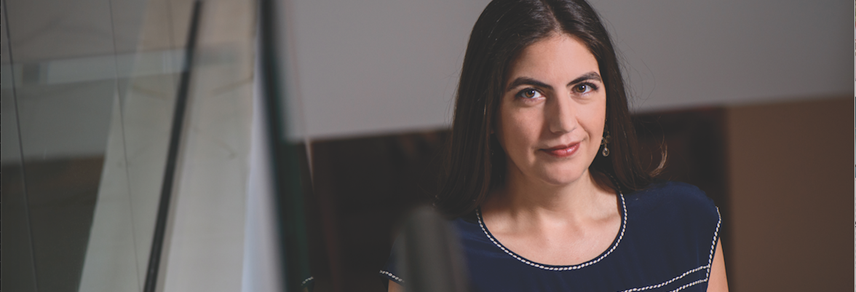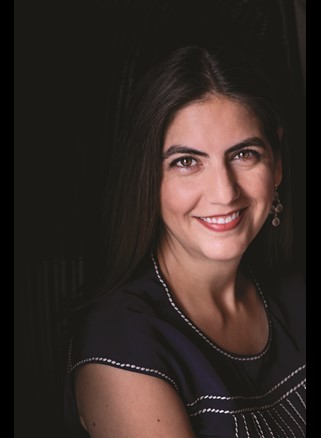
SOLVING & EVOLVING
For Bacardi’s Jessica Merz, a global upbringing has led to a global perspective and the desire to learn. How has this passion for education, coupled with a penchant for risk-taking, characterised Merz’s career? Brittany Golob reports
Photographs by Ivan Apfel
"You’re better off moving with 90% of it feeling right than waiting ‘til you have 100%. It can be a little scary and sometimes it’s a big leap of faith to say, ‘Let’s go. We have enough.’ But rarely have I seen that fail,” Jessica Merz, director of global corporate communications at Bacardi, says about being a proactive communicator. Her philosophy on corporate communications involves being educated, taking risks and engaging in good citizenship.
The South American native, global traveller with roots in Ecuador and Germany has built a career in communications in a relatively tiny 50-mile-long swath of land carved between the sea and the swamp of the Everglades National Park. In addition to her current role at the US headquarters of the international, privately owned drinks company Bacardi Ltd in Miami, Merz has worked in Boca Raton and Fort Lauderdale. The commercial hub of Florida is bounded by water and thriving with the influences of countless cultures from the US, the Caribbean and beyond. And in many ways, Merz’s career has also been influenced by those same factors.
Though she lived in Germany, near her father’s family, until she was two, Merz was brought up in the Ecuadorian capital of Quito and the country’s largest city, Guayaquil. The latter sits on the River Guayas which flows into the Pacific about 700 miles east of the Galapagos Islands. Quito, like Miami, is bound by nature. It sits high in the Andes foothills, between two nature reserves – one of which extends through to the Amazon jungle.
Geography has played a major role in Merz’s education, career and personal life. Her first step in building that career was moving to Florida to attend the University of Miami. Having attended an international school, Merz says it was “expected” that she would apply to American colleges. What was unexpected was the sheer size of the nearly 50,000-strong university. But, the small size of her public relations courses and the familiar cultural experiences available in Miami for a South American native helped her feel at home in the city. Merz found a home in public relations at the same time as she found a home in southern Florida. She travelled to Germany twice on study abroad programmes and did her master’s studies at the University of Syracuse, but, her career has remained focused in Florida.
“One day, I was in PR 101, my very first PR class. I remember having an epiphany that this was what I wanted to do,” she says. “As a communicator, your role is to bridge the gap between what different people are trying to say or different points of view, and helping someone tell a story that is compelling enough for an audience to absorb it and understand it. That’s something I enjoyed. I was super curious as a child and I tried to learn from as many people from as many different background as I could. I think that helped me set up for an entrance into communications.”
That entrance into the profession was somewhat unexpected as well. Merz’s first role was as an intern at Lucent Technologies, which she undertook during her studies. The B2B world of telecoms equipment was not somewhere a young Merz had predicted she would end up. But it became her first true professional home. “I was part of a team of really qualified professionals who gave me all the tools I needed to grow and also gave me a lot of opportunity to grow. And I stuck to corporate communications after that,” she says. “I really think it was that first job that made me fall in love with it.”
Despite rejoining the business in 2000 as a full-time employee, the world had changed. Lucent in 1998 was high on the wave of the tech boom, but two years later, it was facing a major restructuring as the dark ages for dotcoms hit the telecoms business. “It was night and day,” Merz says. But, the experience also built the foundations of Merz’s outlook on communications. “In moments of tough news, some people want to contain information as much as possible. But there’s huge value in being transparent and helping your leaders be transparent. We either give them permission or they’re going t make stuff up that’s probably worse than what the reality is,” she says. “You should trust them. Treat your employees like adults and give them more information.”
That philosophy, while invaluable during a time of layoffs, corporate change or economic difficulties, is a tough one to follow. “It goes against people’s nature,” she adds. “When things are bad, they say, ‘No, let’s wait until we have every detail ready to go.’ And the reality is, you’re never going to have every single detail ready. So you’re better off at least sharing what the process is.” That builds trust between the company and employees, she says, making it easier for both. Going through the difficult process of corporate change in the dire setting of the dotcom crash helped Merz tackle similar challenges in the future.
One of those was during her tenure with DHL. The international shipping giant owned by Deutsche Post allowed Merz to engage a bit with her German roots. But, focusing on employee communications during a change in the business’ purpose required a strong focus on good internal communications and engagement practices.
“I would say it was the hardest job I’ve ever had,” Merz says. The non-stop nature of the logistics sector, combined with a shift away from US domestic services to a sole focus on international shipping made for an eventful five-and-a-half years.
During that time period, though, Merz was able to further learn from crisis and fast-moving situations. In 2007, she was deployed to Peru after a major earthquake as part of a disaster response team comprised of DHL employees. The team coordinated logistics and the incoming shipments of food, water and medical supplies into the country. “I think it’s one of the most rewarding things I’ve done, because you could really see the impact of your product make a life-changing difference,” she says. Emotionally exhausting, it also forced the team to make swift decisions and learn from their environment, apply that learning and take action. The typical business approach of three meetings and countless conversations to make a decision didn’t work in disaster response. A little risk was necessary.
|
Curriculum vitae: Jessica Merz 2011 - present Director, global corporate communications, Bacardi Limited |
  |
“I think it has to be a little risky. In communications, our job is to protect our executives and our brand and the company’s reputation, but we also have a responsibility to push them to be a little more creative, to be risk takers themselves in how they deliver a message; in how they share information. You have to have your facts and figures straight before you start suggesting things like that,” she adds. “It also needs to be true to who you are as a business.”
DHL also allowed Merz the opportunity to travel to Torino, Italy for the 2006 Winter Olympics. DHL, as a sponsor of the US Olympic Team, also ran a shipping centre in the athlete’s village. Merz facilitated a campaign that allowed standout customer service providers among the DHL delivery staff to travel to the Games and take part in the operation there.
At Lucent, Merz’s role was operating across Latin America. At DHL, it was the US region. It was time, in 2009, to expand that focus. Merz took a post as director of employee communications at ADT, a security provider. Her focus there was on a fresh approach to employee engagement. Using the internal magazine, webcasts, radio and CD programmes, TV content and a network of communications champions, Merz’s team helped engage the widespread network of staff across the US and Canada. “An important lesson for us is, ‘You can’t do it all.’ You need to make sure you have a network of people who are the local influencers and make them part of your community.” Bringing people into the communications role helped broaden the broadcasting mechanisms and similarly, draw knowledge from frontline staff back into the business.
After two years, though, Merz took a role that would expand her responsibility from a region to the entire world and joined Bacardi in 2011. She was tasked with creating an internal communications role, as the 150-year-old company had, despite a rapidly growing team, no established IC function.
In addition to travelling to Bacardi’s many production sites from Italy to the UK to Puerto Rico, Merz has created a sustainability team within the business. “I’m personally very passionate about the environment,” she says. “Growing up in Ecuador, we have rainforests and beaches, we have the Galapagos Islands; it’s one of the most biodiverse countries in the world.” Since joining Bacardi, that passion has become amplified across the world.
The business is already one which has long been environmentally aware, as are many drinks producers. Water security, circular agriculture production and sustainable building practices are ingrained into Bacardi’s operations. Merz took it one step further by enabling the company to finally tell its sustainability story to the public and the business community. She harnessed the stories abounding in operations and brought them to life for a wider audience. But, she also helped spearhead the elimination of plastic straws internally, a good two years before the issue became part of the public interest, which cut a million tonnes of plastic per year.
Merz’s focus on good corporate citizenship has been fused with a modern approach to education and an effective attitude toward risk. The company is set to announce the launch of an internal comms tool that Merz calls a “revolution” and required buy in internally to think about internal communications in a different way. Introducing graphic communications and hundreds of videos per year to the IC toolkit has also reduced the divisions within the business, simply by taking a little risk.
But Merz’s education has also been enhanced at Bacardi. In 2016, the company itself took a risk by launching a partnership with one of the world’s best universities. The Emilio Bacardi Harvard Business School Leadership Program is designed specifically for Bacardi employees. Merz took part in the first class of 50 to go through the programme. Learning from Harvard professors and through applicable case studies and projects, Merz and her fellow classmates got a world class education catered to work at the drinks company.
“Because it was built for Bacardi, all the case studies spoke to us and were helping us with things that we’d dealt with in the past and may need to deal with in the future. It gave us a different perspective and forced us into conversations about doing things differently,” she says. “I’m a student by nature. I think that’s what makes me a good communicator. I ask a lot of questions; I want to understand the details. When you’re trying to build communications about any topic you need to get into that level of detail, otherwise how can you explain it to other people?”
Education, check. Educated risk-taking, check. And as far as good citizenship goes, there might be plans in the works for a Bacardi-sponsored underwater clean up by the company’s scuba diving employees. As for travel, with family still in Ecuador and Germany and a list of travel destinations – Romania might be next – Merz’s global outlook extends from her own background, to her education and through her career in communications.



